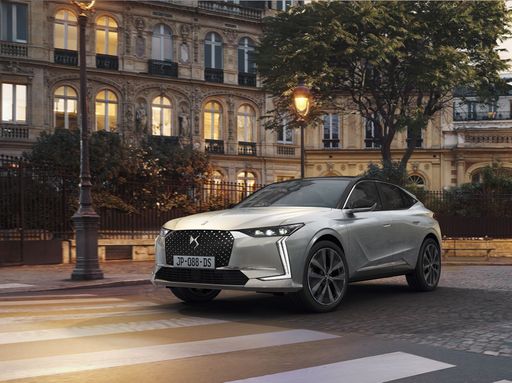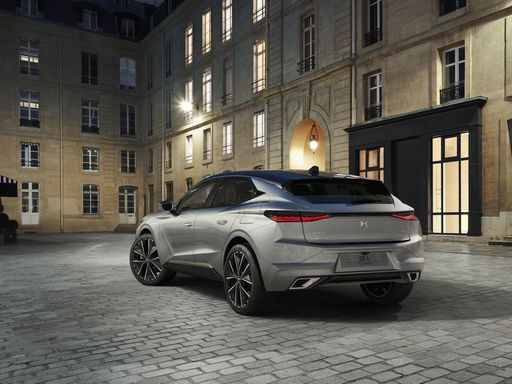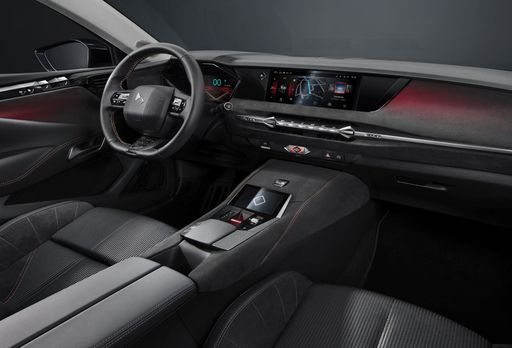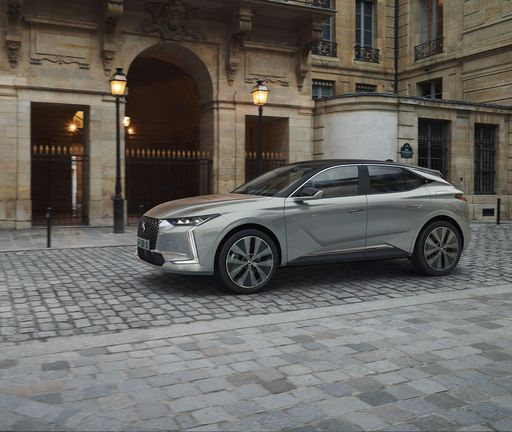DS Automobiles DS 4 vs Toyota Prius – Differences & prices compared
Compare performance, boot space, consumption and price in one view.
Find out now: which car is the better choice for you – DS Automobiles DS 4 or Toyota Prius?
The DS Automobiles DS 4 (Hatchback) comes with a Diesel engine and Automatic transmission. In comparison, the Toyota Prius (Hatchback) features a Plugin Hybrid engine with Automatic transmission.
When it comes to boot capacity, the DS Automobiles DS 4 offers 430 L, while the Toyota Prius provides 284 L – depending on how much space you need. If you’re looking for more power, decide whether the 130 HP of the DS Automobiles DS 4 or the 223 HP of the Toyota Prius suits your needs better.
In terms of consumption, the values are 5.20 L per 100 km for the DS Automobiles DS 4, and 0.50 L for the Toyota Prius.
Price-wise, the DS Automobiles DS 4 starts at 34000 £, while the Toyota Prius is available from 39400 £. Compare all the details and find out which model fits your lifestyle best!
DS Automobiles DS 4
The DS 4 stands out in the compact premium segment with its striking design and distinctive flair. Inside, it offers a blend of luxury and comfort, featuring elegant materials and cutting-edge technology that enhance the driving experience. With its engaging performance and attention to detail, the DS 4 captures the essence of modern sophistication on the road.
details @ media.stellantis.com
@ media.stellantis.com
 @ media.stellantis.com
@ media.stellantis.com
 @ media.stellantis.com
@ media.stellantis.com
 @ media.stellantis.com
@ media.stellantis.com
Toyota Prius
The Toyota Prius stands as a pioneer in the realm of hybrid vehicles, offering an eco-friendly driving alternative with its innovative technology. Its aerodynamic design and comfortable interior make it a practical choice for those looking to reduce their carbon footprint without sacrificing style. Additionally, the Prius boasts a reputation for reliability and efficiency, contributing to its lasting popularity among environmentally conscious drivers.
details @ Toyota
@ Toyota
 @ Toyota
@ Toyota
 @ Toyota
@ Toyota
 @ Toyota
@ Toyota

|

|
|
|
|
Costs and Consumption |
|
|---|---|
|
Price
34000 - 41700 £
|
Price
39400 - 45800 £
|
|
Consumption L/100km
5.20 L
|
Consumption L/100km
0.5 - 0.7 L
|
|
Consumption kWh/100km
-
|
Consumption kWh/100km
-
|
|
Electric Range
-
|
Electric Range
72 - 86 km
|
|
Battery Capacity
-
|
Battery Capacity
-
|
|
co2
137 g/km
|
co2
12 - 17 g/km
|
|
Fuel tank capacity
53 L
|
Fuel tank capacity
40 L
|
Dimensions and Body |
|
|---|---|
|
Body Type
Hatchback
|
Body Type
Hatchback
|
|
Seats
5
|
Seats
5
|
|
Doors
5
|
Doors
5
|
|
Curb weight
1558 kg
|
Curb weight
1620 - 1630 kg
|
|
Trunk capacity
430 L
|
Trunk capacity
284 L
|
|
Length
4400 mm
|
Length
4599 mm
|
|
Width
1830 mm
|
Width
1782 mm
|
|
Height
1470 mm
|
Height
1470 mm
|
|
Payload
442 kg
|
Payload
365 - 375 kg
|
Engine and Performance |
|
|---|---|
|
Engine Type
Diesel
|
Engine Type
Plugin Hybrid
|
|
Transmission
Automatic
|
Transmission
Automatic
|
|
Transmission Detail
Automatic Gearbox
|
Transmission Detail
-
|
|
Drive Type
Front-Wheel Drive
|
Drive Type
Front-Wheel Drive
|
|
Power HP
130 HP
|
Power HP
223 HP
|
|
Acceleration 0-100km/h
10.90 s
|
Acceleration 0-100km/h
6.80 s
|
|
Max Speed
203 km/h
|
Max Speed
177 km/h
|
|
Torque
300 Nm
|
Torque
-
|
|
Number of Cylinders
4
|
Number of Cylinders
4
|
|
Power kW
96 kW
|
Power kW
164 kW
|
|
Engine capacity
1499 cm3
|
Engine capacity
1998 cm3
|
General |
|
|---|---|
|
Model Year
2024 - 2025
|
Model Year
2023
|
|
CO2 Efficiency Class
E
|
CO2 Efficiency Class
B
|
|
Brand
DS Automobiles
|
Brand
Toyota
|
DS Automobiles DS 4
Introducing the DS 4: A Unique Blend of Luxury and Performance
In the competitive world of automotive design, the DS Automobiles DS 4 stands out as a remarkable fusion of elegance, cutting-edge technology, and impressive performance. This hatchback, which continues to captivate enthusiasts since its launch, showcases a commitment to delivering a premium driving experience combined with innovative solutions that adapt to the demands of modern drivers.
Dynamic Engine Options for Every Driver
The DS 4 is available in a variety of engine configurations, catering to diverse preferences among drivers. It features a range of powertrains including diesel, petrol, mild hybrid electric vehicles (MHEV), and plug-in hybrids. With options like the 130 HP BlueHDi Diesel and the Hybrid 136 Petrol MHEV, each vehicle is designed to deliver efficient performance. The plug-in hybrid variant, boasting a robust 224 HP, offers an electric range of up to 62 kilometers, making it ideal for urban commuting while supporting eco-friendly initiatives.
Impressive Technical Specifications
With an array of technical specifications, the DS 4 provides both power and efficiency. For instance, the 130 HP PureTech petrol engine is coupled with a smooth automatic gearbox that enhances the overall driving experience. Depending on the variant, the DS 4 achieves impressive acceleration figures, with the Plug-in Hybrid reaching 0-100 km/h in just 7.7 seconds.
Fuel efficiency is another strong point, particularly with the BlueHDi Diesel's consumption rate at 5.2 L/100 km. The vehicle’s CO2 emissions also vary across models, with eco-friendly options like the plug-in hybrid showing a commendable 32 g/km. This range of specifications allows drivers to choose a version that suits their style and needs while maintaining a focus on sustainability.
High-End Comfort and Innovative Technology
DS Automobiles has prioritized luxury and comfort in the DS 4, ensuring that every journey is enjoyable. With a spacious interior featuring elegant materials and thoughtful design elements, the DS 4 incorporates advanced technology seamlessly. The car boasts a range of trims, including the Collection "Antoine de Saint Exupéry" and Étoile Alcantara, offering various customization options for a personalized driving experience.
The technology highlights of the DS 4 include a state-of-the-art infotainment system and advanced connectivity features that keep drivers connected and entertained on the road. The inclusion of driver assistance systems enhances safety and facilitates a more relaxed driving experience, allowing the driver to focus on the joy of driving.
Safety Meets Innovation
Safety is paramount in the design of the DS 4, which comes equipped with a suite of advanced safety technologies. These include lane-keeping assist, adaptive cruise control, and parking sensors, all contributing to a robust safety profile. The vehicle’s structure and safety features have been engineered to protect passengers and enhance overall collision performance.
Conclusion: A Modern Classic in the Making
The DS 4 by DS Automobiles represents the future of hatchback design, weaving together luxury, performance, and innovative technology into a cohesive package. Its diverse engine choices, cutting-edge safety features, and lavish interiors make it a compelling option for those seeking a vehicle that stands apart in style and functionality. As automotive enthusiasts continue to seek vehicles that are not only practical but also a joy to drive, the DS 4 is well-poised to make its mark in the automotive landscape.
Toyota Prius
The All-New Toyota Prius: Revolutionising Efficiency and Performance
The Toyota Prius, a name synonymous with hybrid innovation, has once again shown why it remains at the forefront of eco-friendly automotive technology. The latest models have enhanced technical features and innovations, setting new standards for efficiency and driving experience.
Hybrid Performance: A Leap Forward
The latest Prius models employ a sophisticated 2.0 litre Plug-in Hybrid system that flawlessly melds petrol and electric power. With a power output of 223 PS, it propels the Prius with impressive dynamism, reaching 0-100 km/h in just 6.8 seconds. This performance-oriented aspect of the Prius does not compromise on efficiency, with an astonishing fuel consumption ranging from 0.5 to 0.7 L/100km.
Electric Range and Efficiency
One of the key highlights of the new Prius is its substantial electric-only range. Depending on the variant, it can travel between 72 to 86 km on electric power alone, making it an ideal choice for urban commutes where zero emissions are preferred. The hybrid system's CO2 emissions are remarkably low, between 12 and 17 g/km, contributing to its CO2 Efficiency Class B rating.
Engineering Excellence with CVT
The Prius is equipped with a state-of-the-art Continuously Variable Transmission (CVT), ensuring a smooth and efficient drive. This advanced transmission supports the front-wheel-drive layout, delivering power seamlessly and enhancing driving pleasure without sacrificing fuel economy.
Stylish Design and Comfort
Designed as a sleek five-door hatchback, the Prius offers a comfortable and spacious interior with seating for five passengers. It measures 4599 mm in length, 1782 mm in width, and 1470 mm in height, offering a practical balance of size and comfort. The boot space, while tailored for the hybrid battery, still provides a decent 284 litres of storage.
Cost Efficiency
The running costs of the Prius are competitive, with monthly expenses estimated between €1064 and €1188, and cost per kilometre ranging from 42.6 to 47.5 cents. Its efficient design results in a maximum speed of 177 km/h and a practical fuel tank size of 40 litres, ensuring less frequent stops on longer journeys.
Conclusion: The Prius Legacy Continues
The Toyota Prius continues to lead by example in the realm of hybrid technology. Combining impressive power with unmatched efficiency and a sophisticated driving experience, it is clear that the Prius remains a compelling choice for the environmentally conscious driver. Its innovative features and favourable cost metrics only bolster its appeal in the modern automotive landscape.
The prices and data displayed are estimates based on German list prices and may vary by country. This information is not legally binding.
